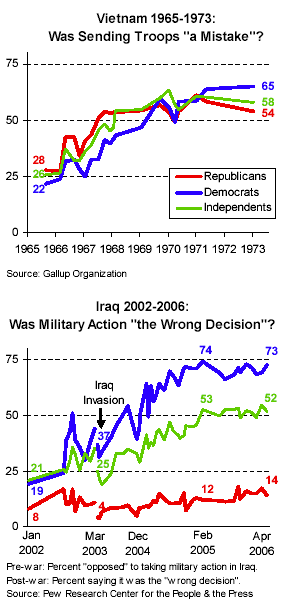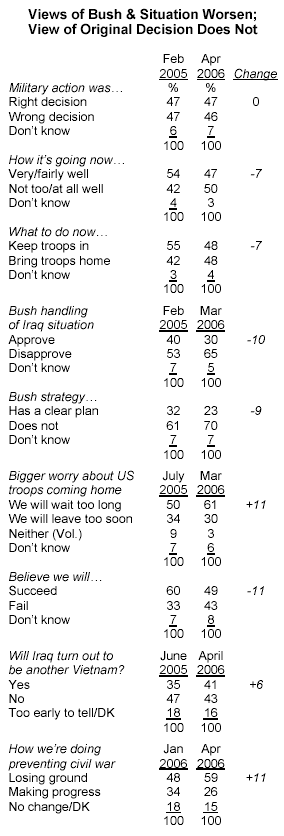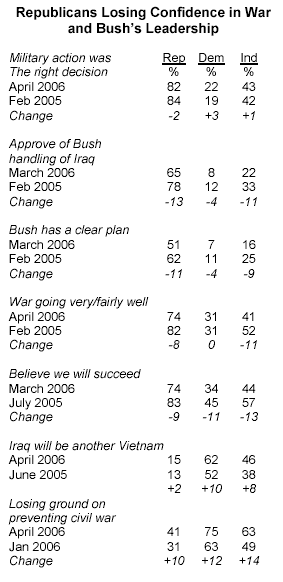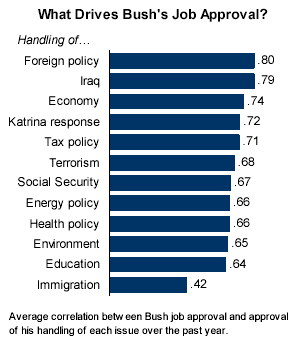by Michael Dimock

Public opinion toward the U.S. war in Iraq bears striking parallels – and clear contrasts – with the war in Vietnam more than three decades ago.
In both cases, presidents tied their political fortunes to the war. And in both cases, they paid a heavy political price when the public grew disillusioned with the conflict.
Yet while opposition to the two wars traced a similar arc, the nature of that opposition differed politically. Although Vietnam is recalled as a divisive conflict, opinions about whether the war was a mistake did not divide sharply along partisan lines. Gallup trends from the mid-1960s through the early ’70s show that the difference of opinion between Republicans and Democrats about Vietnam never exceeded 18 percentage points.
In contrast, Iraq divides America along partisan lines in a way that Vietnam never did. The latest Pew survey finds that 73% of Democrats believe that military action in Iraq was the wrong decision, compared with just 14% of Republicans – a gap roughly three times as great as the largest partisan gap in opinions about Vietnam. (In June 1967, 51% of Republicans viewed Vietnam as a mistake, compared with 33% of Democrats.)

To a considerable degree, this partisan reaction reflects the extent to which views of the war in Iraq are linked to opinions of President Bush’s leadership. Political leadership did play some role during the Vietnam era – Republicans were more likely to call U.S. involvement in Vietnam a mistake throughout the Johnson administration, while Democratic cynicism rose to exceed the Republicans’ after Richard Nixon took office. But the differences appear minor when compared with the current war.
For all intents and purposes, Vietnam ended Johnson’s presidency. In 1968, increasingly negative perceptions of the war drove him out of the Democratic primary. President Bush won reelection two years ago in spite of growing restiveness over the war in Iraq. Since then, his approval ratings have declined steadily and more than any other issue, Bush’s handling of Iraq has been responsible for that decline.
Gloomy Outlook on Iraq
Three years ago, the public judged Bush’s performance on Iraq largely on the original decision to go to war. But today, perceptions of progress in Iraq and views of the likelihood for success are far more influential.
While views on whether taking military action in Iraq was the right or wrong decision have remained unchanged over the past year, opinions about how the war is progressing are not fixed, and are causing a greater drag on the president’s approval ratings. Over the past year, the percentage saying that military action is going well has dropped, and support for bringing troops home as soon as possible has increased.Last summer, 60% said they believed America would ultimately succeed in its goal of establishing a stable democracy in Iraq, but in March of this year just 49% took this view. And even since January, optimism about U.S. progress in preventing a civil war has fallen substantially.
These evaluations of the current situation are what drive changing perceptions of Bush’s leadership, not judgments on the original decision to go to war. Approval of Bush’s handling of the situation in Iraq has fallen 10 points over the past year, and fully 70% say he lacks a clear plan for bringing the situation to a successful conclusion, up from 61% last February.This erosion of confidence reflects changing views of the situation in Iraq now, not a reevaluation of Bush’s original decision to get involved.
Growing GOP Doubts

Republicans have remained steadfast in their belief that the war was the right decision; 82% say that today, almost no change from February 2005. Just 22% of Democrats agree – again, little changed from last year.
But concerns about the situation in Iraq, and the president’s leadership, are on the rise among Republicans as well as Democrats and independents, leading to shakier support for the president within his own base.While Republicans remain far more optimistic than Democrats about the situation in Iraq, a growing minority of Republicans are skeptical.
The proportion of Republicans who believe the US will succeed in Iraq has fallen from 83% to 74% over the past year, and the share who believes the war is going well has dropped by a similar margin. Overall, just 65% of Republicans approve of how the president is handling the Iraq situation, down from 78% in February 2005.
Despite growing doubts, Republicans remain opposed to comparing Iraq to Vietnam.Fully 62% of Democrats, and nearly half of independents (46%) say they think Iraq will turn out to be another Vietnam, up roughly 10-points from last June.But just 15% of Republicans take this view, while 73% reject it, a margin that is virtually unchanged from last year.
In most regards, independents’ views of Iraq are more similar to those of Democrats than Republicans. The percentage of independents who believe we will succeed in establishing a stable democracy has fallen from 57% to 44% over the past year, and most independents believe that we are losing ground on key elements of the battle.Just 22% approve of how the president is handling Iraq, down from 33% a year ago.
Why Iraq Matters
Views of the president’s handling of the Iraq situation, and foreign policy more generally, drive his overall job approval ratings, and Bush’s recent slide in the polls reflects growing public doubts about Iraq.

Consistently, the president’s overall job approval ratings are more closely tied to evaluations of his handling of foreign policy and Iraq than any other issues, including the economy, the response to Hurricane Katrina, or terrorism policy.Put another way, nearly everyone who approves of the president’s performance in Iraq approves of his overall job performance, while nearly everyone who disapproves of how he’s handled Iraq disapproves overall as well.While this is the case with many evaluations of Bush’s job performance, the linkage is tightest when it comes to foreign policy and Iraq.
While partisanship is a large part of this, Iraq and foreign policy stand out as the key factors in Bush’s approval ratings even when political leanings are taken into account.Among Republicans, Democrats and independents ratings of how the president has handled Iraq and foreign policy are the most closely tied to overall job approval ratings.
In this regard, Bush’s current standing in the polls, while affected by the public’s gloomy economic outlook and concerns about energy prices, immigration and the government’s response to Katrina, is anchored most directly to the situation in Iraq. It will be very difficult for the president to revive his job approval ratings without achieving clear progress in Iraq in the public’s eye.




